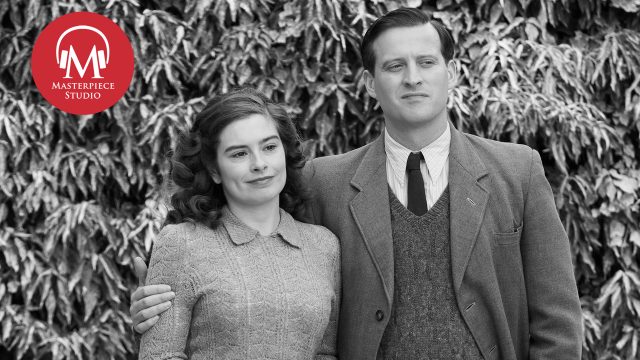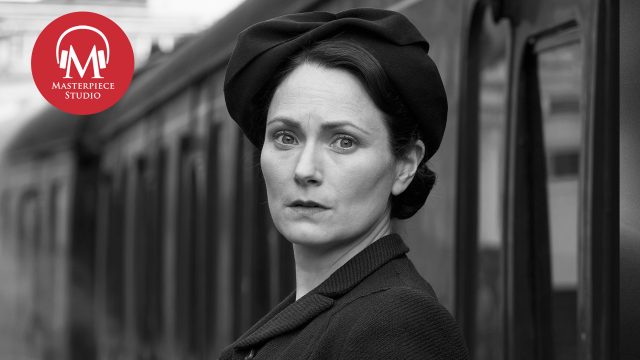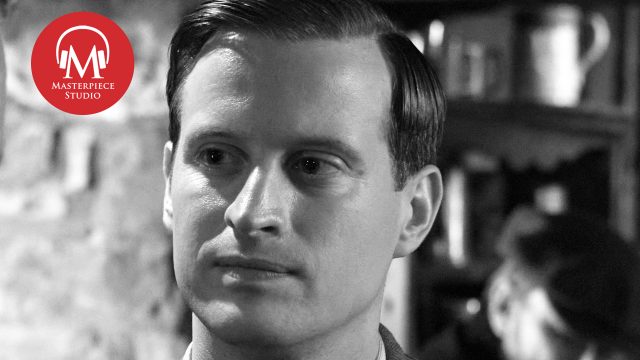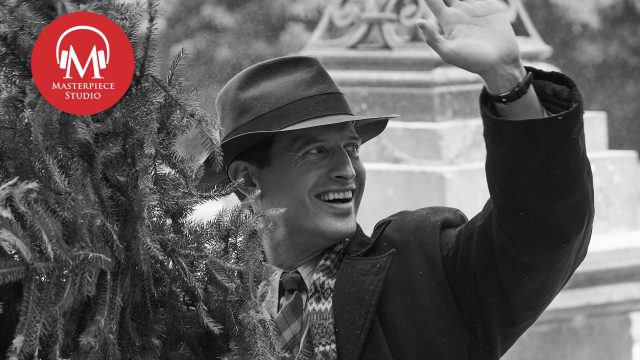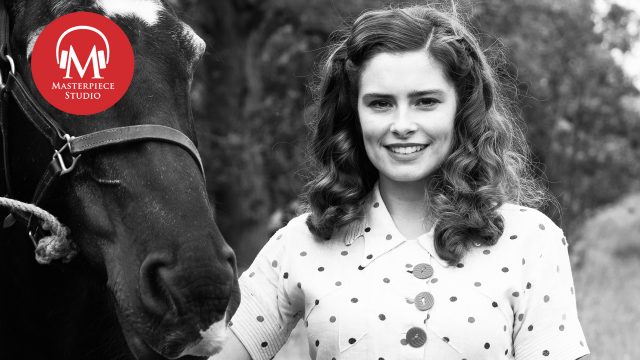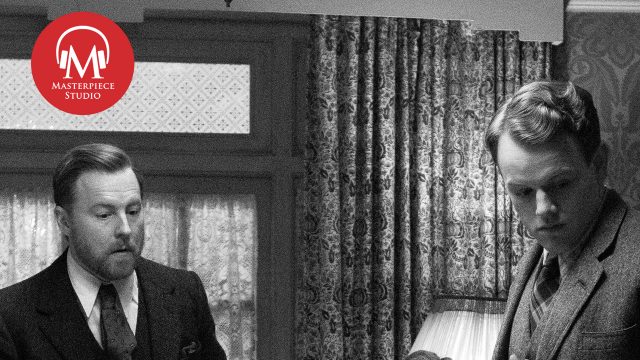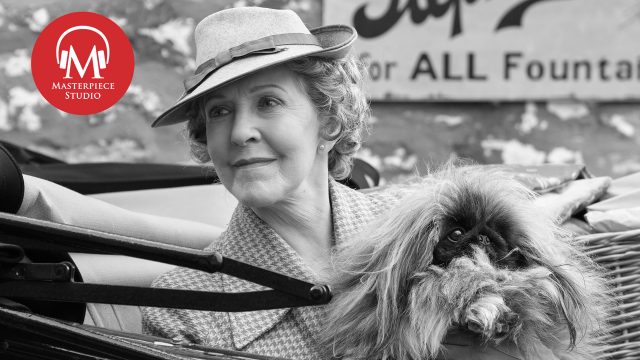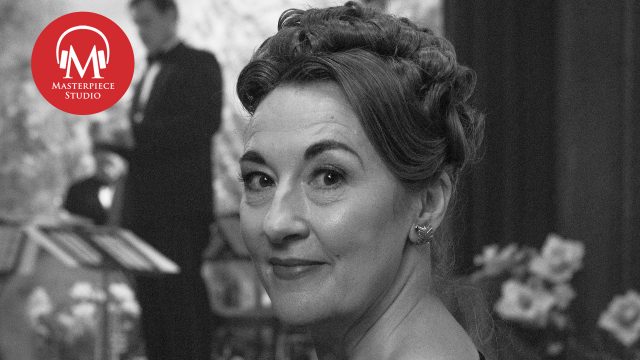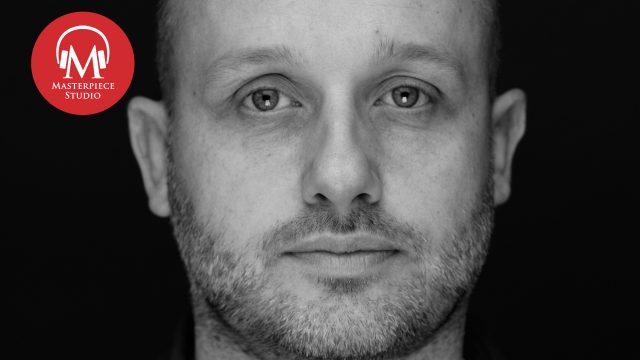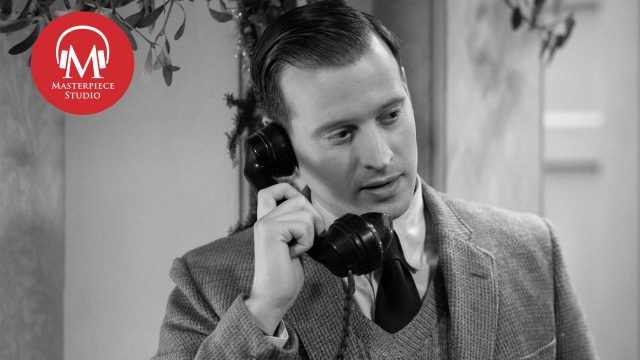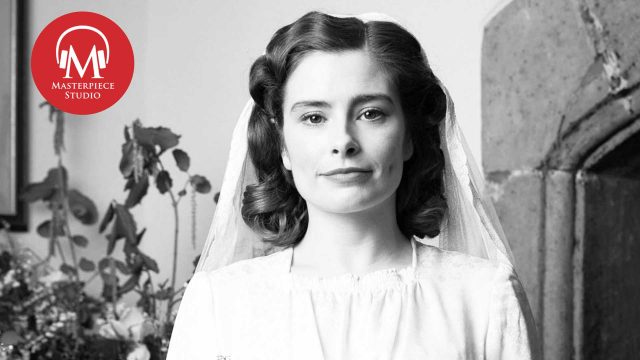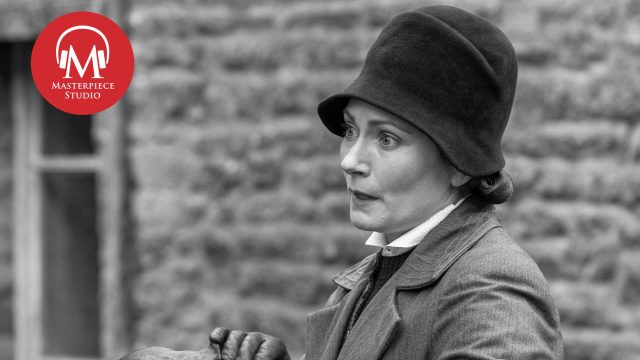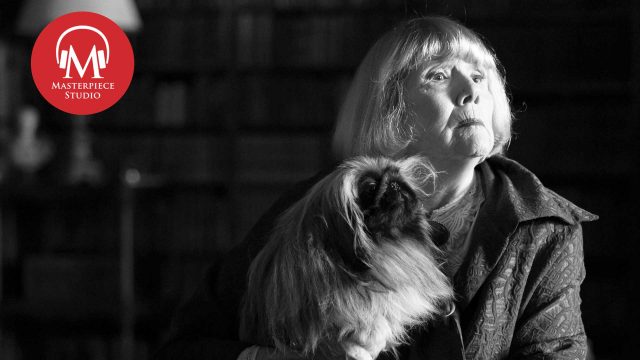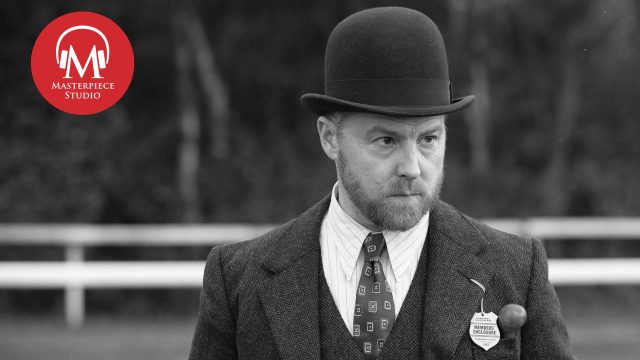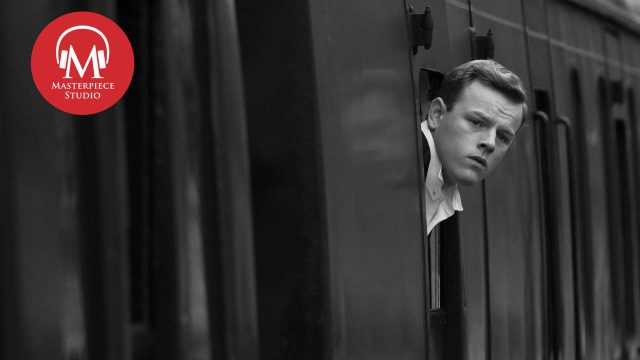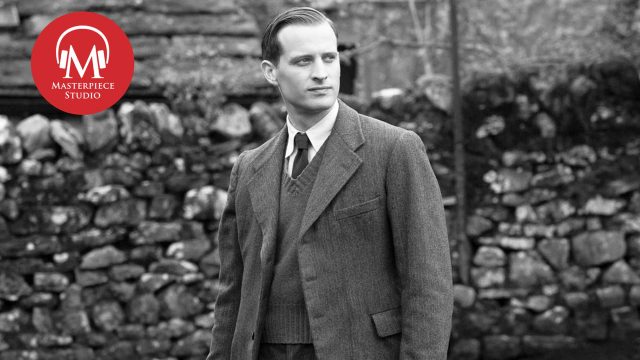On any given episode of All Creatures Great and Small, a wide variety of animals pass through the scene with injured hooves or damaged snouts. It’s up to animal handlers like Jill Clark, of 1st Choice Animals, to train those furry guest stars to sit still, lie down or play dead — which she does to great effect. Clark explains the hidden human touch required behind the scenes to bring a rural veterinary practice to raucous life…and reveals which cast member Tricki Woo loves best.
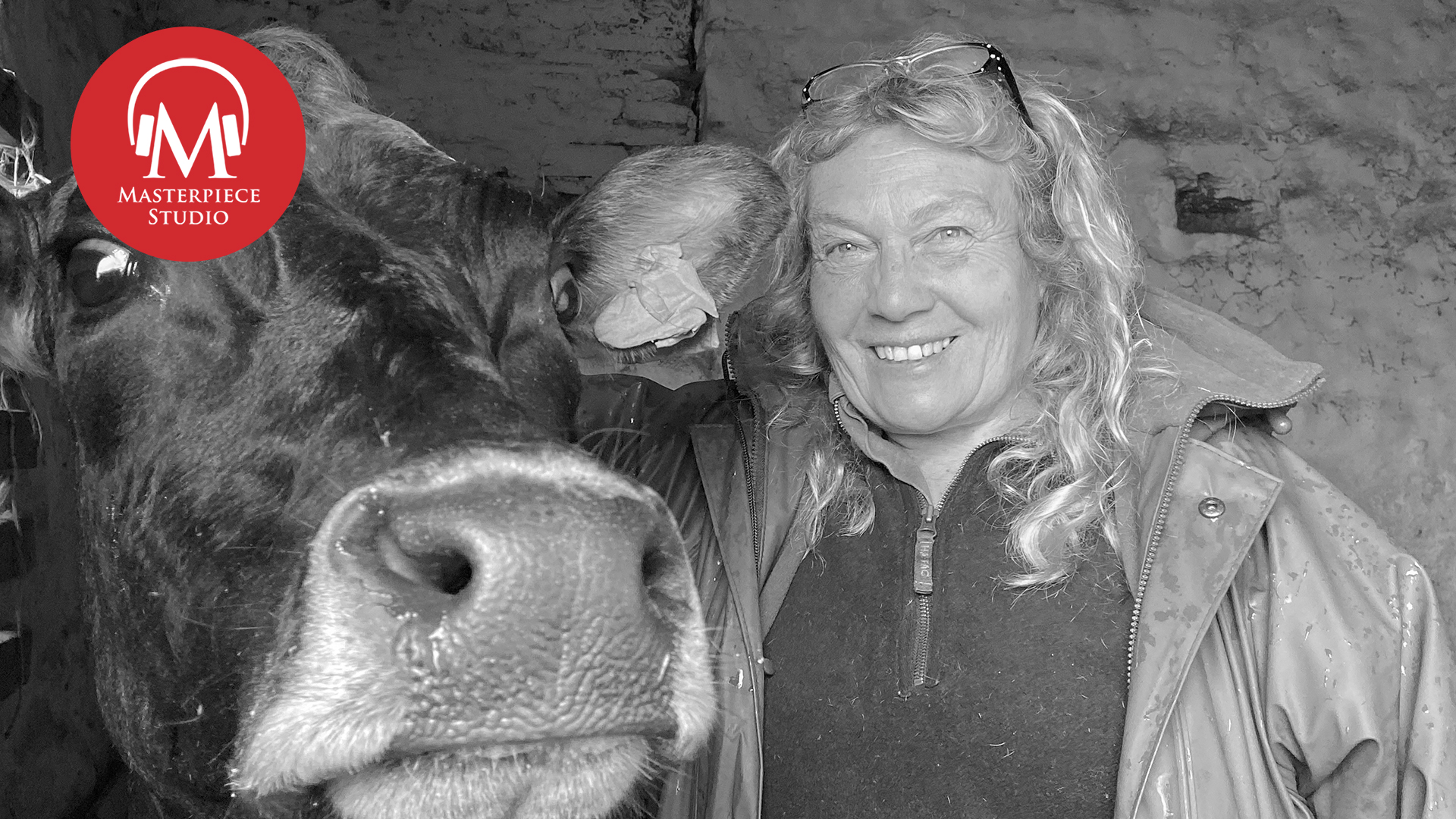

There’s No Creature Too Small For Jill Clark To Handle
Released 29:28
Related to: All Creatures Great and Small, Season 3
Download and subscribe on: iTunes | Spotify| RadioPublic
Transcript
Jace Lacob: I’m Jace Lacob, and you’re listening to MASTERPIECE Studio.
All Creatures Great and Small is a show about veterinarians, so it’s no surprise that their animal co-stars get a lot of the limelight.
CLIP
Florence She was absolutely fine, running around on the drive when she just suddenly seized up and sort of toppled over onto her side gasping and drooling. I’ve given her the once over but I can’t seem to find anything.
Tristan That doesn’t sound very pleasant. How old is she?
Florence She’s too old for it to be epilepsy, if that’s what you’re thinking.
Jace From in-clinic visits with cats, dogs, and parakeets to distant farmyard inspections of horses, cows, and more, every episode of the series is packed with animals.
CLIP
James Hello little ladies, hello, hello…what seems to be the trouble with you then?
Kate Billings Been a bit gip last day or two. Diarrhea and sickness. I were worried.
James They’re absolute beauties.
Kate Billings You don’t need to tell me that.
James No, of course. I was just… Temperature’s normal.
Jace Behind the scenes — and sometimes, in front of the camera, too — a vast array of animal trainers and real-life veterinarians keep a close eye on the furry stars of the series.
CLIP
Tristan Make sure you keep brushing him regularly, otherwise the fur will get matted again.
Charlie Thank you, Tristan. Come on, Richard. Let’s get you home.
Jace One of the series’ throughlines has been Jill Clark of 1st Choice Animals, a firm supplying all manner of animals for film, TV, and the like. Clark joins the podcast to give a peek at the pleasures and perils of non-human television character actors.
Jace And this week we are joined by All Creatures Great and Small animal handler Jill Clark, of 1st Choice Animals. Welcome.
Jill Clark Good afternoon!
Jace Before we get into any specifics with All Creatures Great and Small, I’d love to know, how did you get into this aspect of the entertainment business, specifically?
Jill Many years ago, I used to run a dog club with my ex-husband, a dog training club, and a very dear friend of mine who wasn’t at the time, that knocked on the door, came in to see us and said, ‘Can you train the dog to bite the postman, because we’re doing an ad campaign for it?’ And I said, ‘Yep, yeah, that’s fine. I can do that.’ And I went off and did the job and I have never looked back since.
Jace That’s amazing.
Jill And that was 42, 43 years ago, and she’s still one of my closest friends.
Jace That’s amazing. I love that. What was it about early work like The Bounty with Mel Gibson or Legend with Tom Cruise that made you realize then that this was what you wanted to do with your life after training the dog to bite the postman?
Jill I just fell into it completely naturally. It was just being in the right place at the right time. It was the ideal job for me. I’ve always been an animal lover. I didn’t grow up with them, because my parents were quite, quite wary of them. But it was something I had never even dreamt of doing. I didn’t even know the job existed, but after that it was just, I just fell into it. And it is my dream job and I couldn’t think of doing anything else.
Jace I mean, so, that dog then was the first animal that you trained. What was the first non-canine animal that you trained?
Jill I went on to Legend and we had just about everything there. We had chickens. We had a brown bear on it.
Jace Oh, wow.
Jill Pigeons, lots of pigeons, lots of birds flying around, foxes, deer, absolutely just about every animal you could think of. Every woodland animal, we had badgers, myrna birds. And that was it, I started working with those.
Jace A true menagerie, then.
Jill Absolutely.
Jace On that first one.
Jill. Yeah.
Jace That’s amazing. So you run your company with your son, Dean, who’s now a second generation animal handler.
Jill He is.
Jace Did he then grow up around the animals wanting to follow in your footsteps, or was he hesitant?
Jill Not at the time. Very hesitant at the time. He always, always, always came second to them, both my children did, because Christmas Day, the animals got out and we had to go and find them. The horses had gone to church. I had to go out and find them. So it was, he always came second to them. And so therefore he didn’t really have much compassion for them because he wanted to go off and do other things, and the animals always came first. A complete change around now? And now he’s the one that, you know, he wants to carry the business on.
Jace What was the thing, then, that that changed for Dean, that that made him say, actually, I do love animals and I do want to work with these animals?
Jill Well, he actually he went through quite a rough time and moved away from the area and came to stay with me. And he just said, one day, ‘I’m bored, I’m coming to work with you.’ And that was, that was the starting point. We went off and worked a dog together and then he went off and worked a load of rats the following week. He said, ‘I quite like this, it’s not boring as I thought.’ And that was that, he was off. And since then, he works all the big animals. He works the horses and the cattle. And I just get stuck with the little things, I do the dogs, the cats, the reptiles. He’s not a good reptile lover. So I get to do those.
Jace All Creatures Great and Small obviously revolves around animals. A whole lot of animals, in fact. How familiar were you with the James Herriot memoirs or the original 1970s series ahead of this?
Jill I of course watched all the originals. I used to be glued to them. That was my era. Sunday night television. We were always watching, always. It was just a part of our world just to watch that. So I knew the stories, I’d read the books, but Dean has gone into it quite blind. He hadn’t read the books or seen any of it, so it was quite fun for him.
Jace I mean, what’s you know, what sort of unique challenges does All Creatures Great and Small then offer in terms of working with animals, given, as we said, that we’re not just talking about, say, a dog or cat, but often rats or a herd of cows, or a pregnant horse or any number of animals at any given time could show up?
Jill We go through the scripts, and we have a compound where we keep all our animals and as we go through the scripts, we’ll either add to it or send them back to the various farms that they came from. So we keep them with us. So we’re pretty set up. So if we do need a herd of cows, we’ve got them there. In England, we have a lot of problems moving animals around the country. We have to go definitely by definite regulations and we have to follow those to a T. So that is always quite difficult.
Jace Is that due to TB?
Jill It is, yes. It’s so the government can keep control of where all the animals are. Any cloven hoof, which are the horses, sorry, the goats, sheep, pigs, anything with cloven hooves so they know exactly where it is so they can control spread of disease, should it happen. But we’re very, very careful and we have all sorts of biosecurity in place just to cover the local farmers and to cover our own animals, because we have to be as clean as we can so we don’t bring any diseases from anywhere.
CLIP
Kate Billings That’s two I’ve lost now.
Siegfried I’m so sorry. Let’s take a look. Temperature’s normal but there is definitely evidence of gastritis.
Kate Billings That’s what Mister Herriot said.
Siegfried My best guess is that she’s ingested some sort of irritant somehow but I don’t see anything in here it could be.
Kate Billings He said that an’ all.
Siegfried I’ll do a post-mortem on the calf you lost, and order a lead estimation test… he’s done that too, hasn’t he?
Kate Billings Aye. He has.
Jace I mean, it’s interesting that with the TB regulations, given how prevalent bovine TB is in this series on All Creatures, I mean.
Jill Yeah.
Jace I mean, so what are relationships like then with local farmers on whose land your livestock are moving? What kind of relationships do you have with the locals?
Jill Really good. Yeah, really. I mean, they love us coming. They love it because, you know, they. They’re all Yorkshiremen. They all grew up with James Herriot. So to have them filming on the land, on their own land is quite something for them. So they do enjoy it, they do enjoy it.
Jace Before this next question, a brief word from our sponsors…
This series introduces a number of new animals, including a piebald rat named Villanelle, who becomes a companion for Siegfried after he wins him in a drunken bet at the pub.
CLIP
Mrs. Hall Breakfast will be just a minute. The rat’s yours, I presume.
Siegfried Ah… Yes… I do now recall…
Mrs. Hall Do you?
Siegfried Not particularly no.
Jace What goes into casting a rat?
Jill Just the temperament. As long as you can pick them up and they’re happy when we first get them. I bought, we do have three of them, but we…Sam actually knows his rat. You cannot fob him off and give him one of the others because he knows that rat intimately. But we did buy three, just in case somebody, you know, gets a bit poorly. But we just we, we buy them for their temperament and we just keep working with them. I have a lot of grandchildren, so I use them as crash test dummies. So they have to play with the animals a lot just so they’re used to it. They get a lot of handling, a lot of care and a lot of attention when they’re at home. Because that’s where the majority of our training starts at home. So we just spend a lot of time. It’s all time. Time and patience.
Jace Time and patience, I would imagine. Yeah. You mentioned temperament with rats. I mean, how temperamental are they as performers? Are they easy or difficult to train, compared to other animals?
Jill I love rats, and they are, rats are very clever. They make actually super little pets, they’re real sweeties. They’re a nice little animal. I would prefer a rat to a guinea pig. I think they’re just cracking animals. I think every kid should have one. They’re really, and they’re smart. They are clever. They do learn quite quickly. It’s not, Villanelle doesn’t have to do an awful lot. But, you know, if Sam puts his finger, and he jumps, say he’s asleep when he jumps. He’s you know, he’s not going to bite him. The temperament’s there.
Jace It’s incredible to me. I mean, a lot of animals are food motivated into performing and hitting their marks.
Jill Yes.
Jace But some seem more uniquely suited to performance than others, like Derek, who plays the much loved Tricki Woo. But what is Derek like in real life, and how has he dealt with fame?
Jill Yeah, Derek’s a diva. When he’s at home, he potters about, he minds his own business, he doesn’t get involved with the others. He’s just a cracking, cracking little dog. I don’t know anybody that doesn’t like him. He’s just a real cutie. He’s a real smart and he’s a smart dog. But when he’s at home, apart from having to have his gig, I’ll try and keep up with his baths. He lives his life alongside the other dogs and the horses and the goats, and he’ll come over and say hello to them and he’ll just potter off back again.
Jace And then when he’s not filming, he’s pretty down to earth is what you’re saying.
Jill Yes. Yes. He has no airs, but at the end of the day, he is a dog. But he is my family. He’s a family pet. So he just mixes in, and I’ve got 12 dogs here and they just all jog alone, quite happy. I’ve just moved, so I’ve got more space for them all. And we just spend all our days out in the yard, out in the fields just pottering about and Derek’s there as well. Getting absolutely rotten. And coming in looking like God knows what he looks like, dragged through the veg backwards, but he likes life. A good little kid, he’s a lovely little dog.
Jace I love it. Which member of the cast has Derek taken a shine to the most? Is there one?
Jill He loves all of them, but I would say probably Callum. I think Callum and Tricki and Derek have a real, they have a love affair. They really do. I never wanted to admit to that, but yeah, I think Callum’s the one.
Jace Oh, I love that. The role of Mrs. Pumphrey was recast after the unexpected death of Diana Rigg as Patricia Hodge stepped into the role. Was there any concern on your part that Derek might need to adjust to Patricia, or is Derek just such a consummate pro that he just sort of went with it?
Jill No, he just is quite happy wherever he goes and whoever you leave him with is as good as go. And Patricia absolutely adores him. Really, really, really. They both did. Dame Diana did as well. But Patricia, they’re a couple made in heaven, they’re a really good match. And they do idolize each other.
Jace Given how closely Derek worked with the late Dame Diana, and now works with Dame Patricia, I mean, what sort of relationship do you as Derek’s trainer have with those actors that are working so closely with him?
Jill Dame Diana, not so much, but Patricia, she was just my best friend when I was there. So we spent hours just nattering, and we have a very, very good relationship.
Jace Is it true that Derek gets a turn in the makeup chair before shooting?
Jill He’s the first one in the chair. He has a bit, because his face is so black, he has a little bit of makeup put just across his nose, which just so his eyes show up a bit more, yeah.
Jace That’s incredible. I mean, has Derek ever turned up his nose at a direction that has been given to him?
Jill Never. Never, never, never.
Jace He’s, just a pro. He’s a pro.
Jill Yeah. Yeah, he’s good as gold.
Jace I mean, not surprisingly, this being Yorkshire Dales farming territory, dogs are a big, big part of Siegfried and James’s veterinary practice. Dachshund Frankie, I know, was another hit with the cast of All Creatures. Where did Frankie come from?
Jill Frankie was bought for me in 2011 by a very good friend of mine. And he came over from the Czech Republic. He was eight months old by the time he got to me. He was a funny little thing. And some days he liked people, and other days he didn’t. But he went into the world of filming and just accepted it as good as gold. Absolutely one of the most darling little dogs you could ever possibly meet. I don’t know anybody, again with Derek, I don’t know anybody that doesn’t like Frank. . He’s getting a little old man now. He’s got very old because he’s he’s coming up 12. He’s got a little gray beard. He certainly slowed up a lot, but he’s still here, fighting to get his place in the middle of my bed and winning. And winning.
Jace Golden retriever Ernie, who plays Jess, is another favorite among the cast. And Ernie replaced George, who sadly passed away at the end of series one. Is it true, then, with Ernie that Callum is always angling for more screen time with the golden retriever?
Jill Yes, yes, yes. Just because he’s such a nice dog, I mean he’s gorgeous. And anybody would be, he goes in with this humongous bundles of energy and just likes to show himself off to the best of his abilities. Sometimes he just preempts everything. But he just loves life and it just shows in the show now. It really shows what a happy, outgoing dog is. And he just loves to be with everybody and certainly with Callum and Anna, he seems to have taken a shine to them.
CLIP
Tristan And how are you today, Rock?
Gerald Oh, he’s grand.
Tristan Yeah he looks it.
Gerald He’s always excited for his walks with Jess.
Tristan I’m sure he is. You know, we care a great deal about… Jess. She’s a part of the family and we’d hate for her to get hurt.
Gerald I can assure you that… Rock cares a great deal about Jess too and would never do anything of the sort.
Tristan Good. That’s good then.
Jace In this week’s episode, we also meet another dog, Florence’s Dalmatian Daisy, who is treated by Tristan as she struggles to breathe after swallowing a small pebble, and she requires a quick procedure to save her life. How did you train this dog to behave just how the director required?
Jill This is my Angelica, I trained her to lie flat on the floor, and then we trained her to lie flat on the table. And then we carried that on by lying flat and then having somebody hold her head up. Then somebody opened her mouth. Just lots of practice. Lots of prep and lots of training and lots of patience again. But she is she’s my own dog. She’s now eight. I’ve had her since she was a tiny puppy, I had her mum and she’s just part of the family and because she’s just a part of the pack she’s, she’s pretty easy to work with and she knows, she knows the system because she comes along with us enough.
Jace I mean, does that help then, in that this is not a new dog that you’ve brought in especially, but as you say, as she Angelica’s a member of your family. She lives with you. She knows you and trusts you implicitly, that then you can…
Jill It’s the trust, yeah, it’s the trust thing. They have to trust you because you come into that situation and they, you know, they didn’t really get a say in it. We just, you know, cast them. But we have to have 100% trust with them that they’re not going to get hurt in any way, that we’re going to look after them and they’re going to have fun when they’re there, because otherwise it’s just you know, it’s just not right. It’s not part of my job to upset any of the animals.
Jace This series isn’t just about life and death. There is also the matter of birthing. How involved are you and Dean in this process, and how do you both calculate the needs of the production, the welfare of the animal and the actual birth itself?
Jill We bring the pregnant animals up to our farm where they’re used to us wandering around. We set up a filming set at the farm, so everything, there’s no surprises to the pregnant animal. So we’re just on 24-hour watch, we have cameras set up. But it’s very planned out. But we do insist on very minimal crew. There’s usually about three of us, which is the cameraman, the director doesn’t always get there, the actor is on standby or we have a double that comes in and just quickly puts the stand-in’s clothes on, the actor’s clothes on. And we do it that way. But everything is kept really, really, really quiet. Very quiet, very few people. So it’s no surprises to the animals giving birth if we are in the room with them because they’re used to us being there pottering about.
Jace Wow. I mean, that’s crazy to me. How do you know to expect, you know, that there is a need for a pregnant animal and live birth. Are you working backwards based on what producers are…
Jill Yes.
Jace Expecting forward, how does that work in terms of your planning? That seems almost impossible to me.
Jill Well, it is difficult, but if we know we’ve got a birth coming up, then we will go back to wherever the supply is or wherever we can find the pregnant animals. And we have a there’s only a certain time that we can move them, which is before the last third of their trimester. And so we can, we move them then, and that’s when they come into the farm and that’s where they stay there. But timing is difficult. That is a bit of a headache for us.
Jace That’s so crazy. This week’s episode also finds James Herriot struggling to figure out what is poisoning a herd of calves on Kate Billings’ farm. Is this a similar situation where you are sort of setting up a shoot with multiple calves in pens ahead of time and swapping out actors? Is that sort of again, this part of this sort of TV making magic that you’re talking about?
Jill Yeah, well they go over there the six days before we start shooting, do we have to then start looking after them in their new place, and set up everything so they’re used to their new accommodation, we have to work it that way. As I say, the timing is always difficult. It’s a constant headache because then a few days later, you’re going to want the calf somewhere else. They did. I think they did multiply them a little bit because we only had six calves. So I think we did get some, a bit of filming magic in that.
Jace The, uh, the magic of television in the end. The animals are often swapped out with very lifelike replicas for very specific procedures and the like. How does production deal with that swap? When does the facsimile come in, and the live animal go out?
Jill Um. That’s difficult. We had the prosthetic neck for Angelica, the dalmatian, when they were actually going in to do the incision. So we had ‘Gelly on the table, and then as soon as they went to go put the knife in, that’s when we swapped her out and put the smaller piece of dalmatian stuffy in her place. So, you know, we don’t actually ever carry out any of the treatments on the live animals. So we’ll go as far as we can with the live ones. And then that’s when we start chopping them out, or if they change the camera angles so you don’t see the whole animal, then we can get away with it, the prosthetics.
Jace I mean, that’s what’s even, that’s what’s amazing to me, even in the case of Angelica with Daisy sort of struggling to breathe, is that that was actually a live animal that you had trained to sort of, as you say, to get Angelica to lie flat.
Jill Yeah.
Jace And I did not think that at the time, I didn’t think that that was even possible to do, so, well done, Jill.
Jill Oh yeah! I mean, we’ve had we’ve had anesthetized, well, supposedly anesthetized cats that are laid flat out, in the second episode we had a white cat that was flat out on the table, but that was trained to lie flat and stay there.
Jace That’s so crazy.
Jill We had a ginger cat in the first series that was lying flat on the table. And they’re all, they’re all alive. And we don’t use any form of tranquilizer or drugs at all. They’re all trained.
Jace Amazing. I mean, this has been fascinating and I’m sure we’re just scratching the surface, but I am curious, what is something about your role on All Creatures Great and Small that viewers wouldn’t necessarily realize from home?
Jill I think it’s the fact that there is somebody up there training the animals to do the actions. They’re not just being treated by a vet. I think some people will be quite surprised at what we actually can get to try and get the animals to do, like the poorly cow that had fallen in the river, Dean had trained that to limp and to hold its leg up.
Jace Oh wow.
Jill So he trained that just to sort of hold his leg up and Mark with the horses, he trains them to limp. The same with any of the animals, we can train them to do what is ever, what is natural to them, what we can’t train is anything that is unnatural.
Jace I mean, cows to me are interesting because they are, they are pack animals. You couldn’t just really sort of cast one on its own. And I did not anticipate that that cow was actually trained by Dean to do that. Do cows ever get spooked by filming?
Jill We try to get them used to everything so they don’t spook. But if they do spook then you, you do actually, you would have a stampede on your hands because they just flight. They just go. So, yeah, we spend a lot of time just working with them and getting them used to as much as we can humanly get them used to just by taking, you know, flags, booms, just taking them into the farm and getting them used to them being there. People, we have to prep against it all the time. It’s it’s not easy. People just expect them, the cast and the crews just think that we magically turn up with these cows and they’re quite used to everything. They’re not an awful lot that goes on behind the scenes with us working with them.
Jace And finally, what has been the strangest request for an animal that you’ve received to date on a production?
Jill I think they can all be strange. ‘Have you, have you got a cat that will use a knife and fork to eat?’ I said ‘No, but I’ve got one that uses a spoon.’ He said, ‘Oh! Can we have that one?’ ‘Okay.’ Yes, I do have some, ‘Yeah. Have you got a polar bear?’ ‘Well, no. Have you, have you tried all the circuses and the zoos?’ ‘Yes.’ ‘So you thought you try the smaller animal people just to see if they’ve got one sitting at the end of their garden? There’s very few polar bears around now. And I don’t have one.’
Jace Oh, incredible.
Jill Yeah, we do get some strange requests, and we’re quite used to it. You just take it in your stride now because you’re never sure if somebody’s just taking the mickey. But most of them are deadly serious.
Jace Amazing. Jill Clark, thank you so very much.
Jill You’re more than welcome, and thank you.
Jace We head behind the scenes in a very different way in a very different time and place — a snowbound luxury hotel high in the mountains of France.
CLIP
Eliza I’m so sorry, my husband was having the most dreadful nightmare.
Hotel Manager Your husband? The gentleman in this room checked in alone.
Eliza Well, I’ve only just arrived, I was visiting some friends in Compiègne.
Hotel Manager What is that?
Eliza Twenty Francs to walk away and ask no more questions.
Jeremiah Slade Help me! Help me! Please help! Jace Miss Scarlet and the Duke creator, head writer — and, for the first time, director — Rachael New returns to the podcast January 22nd for a look at what she learned the first time she stepped behind the camera.
MASTERPIECE Studio is hosted by me, Jace Lacob, produced by Nick Andersen and edited by Robyn Bissette. Elisehba Ittoop is our sound designer. The executive producer of MASTERPICE is Susanne Simpson.
All Creatures Great and Small Podcasts 16 More Podcasts
MASTERPIECE Newsletter
Sign up to get the latest news on your favorite dramas and mysteries, as well as exclusive content, video, sweepstakes and more.











